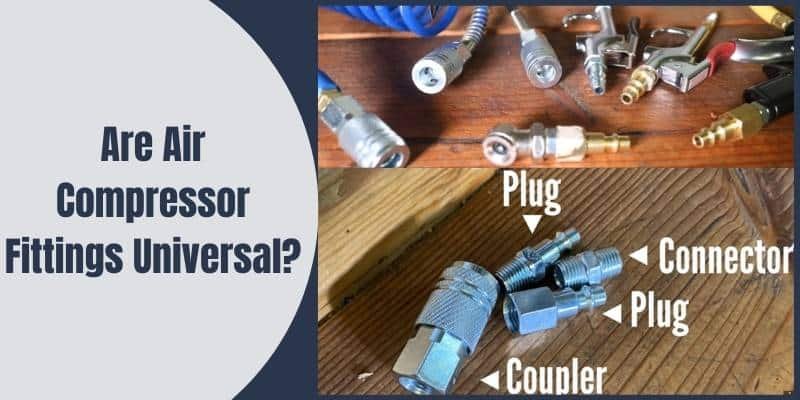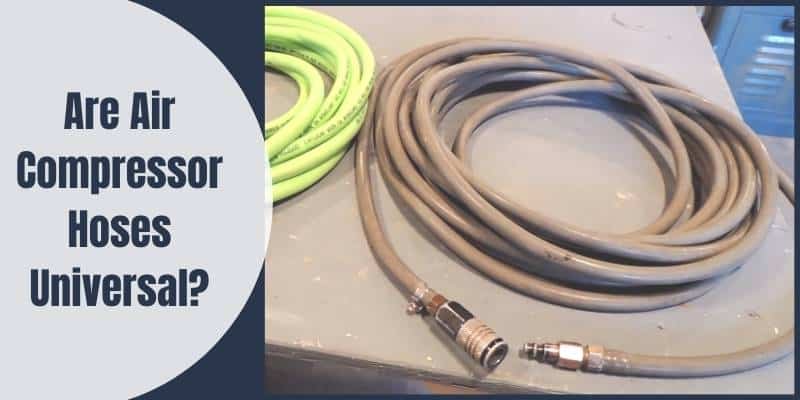Disclosure: This post contains affiliate links and I will be compensated if you make a purchase after clicking through my links. Learn More
The check valve in your air compressor is responsible for maintaining pressure and ensuring that air flows in the right direction. However, like any other mechanical component, it can deteriorate over time, leading to various issues.
In this comprehensive guide, we’ll delve into the symptoms of a bad air compressor check valve, providing you with valuable insights and solutions to keep your compressor in top shape.

Common Symptoms of a Bad Air Compressor Check Valve
When the check valve in your air compressor is not working properly, it can cause a range of issues that can affect the performance of your compressor.
The most common symptoms of a bad air compressor check valve are air leaks, a drop in pressure, or the complete inability to build pressure.
How to Tell If Air Compressor Check Valve Is Bad?
Perform a visual inspection of your air compressor’s check valve. Look for signs of corrosion, damage, or wear. Rust, cracks, or weakened components are indicators that the check valve is deteriorating. In such cases, it’s advisable to replace the valve quickly to prevent further issues.
Some Physical Signs of a Bad Check Valve
When the check valve of your air compressor goes bad, there are several physical signs that you can look out for. Here are some of the most common ones:
Strange Sounds
A noisy air compressor can be a telltale sign of a bad check valve. When the valve is failing, you may hear a hissing or chattering sound as air escapes back into the pump. This noise can be quite distinct and is usually a clear indication that the check valve needs attention.
Difficulty Starting
A bad check valve can make your compressor’s motor work harder than necessary. If you notice that the motor has trouble starting, or it repeatedly attempts to start without success, the check valve may be to blame. This can lead to increased wear and tear on your compressor’s motor, potentially resulting in costly repairs.
Air leaks
One of the most obvious signs of a bad check valve is air leaks. If you notice that your compressor is leaking air, it could be due to a faulty check valve. You may hear hissing sounds or feel air escaping from the compressor.
Low pressure
Another physical sign of a bad check valve is low pressure. If your compressor is not producing enough pressure, it could be due to a damaged check valve. This can result in slower performance and longer wait times for your tools to operate.
Overheating
If your compressor is overheating, it could be due to a bad check valve. A damaged check valve can cause the compressor to work harder than it should, leading to overheating. This can be dangerous and could cause damage to the compressor or other parts of the system.
Oil contamination
A bad check valve can also cause oil contamination. If you notice that your compressor oil is dirty or contaminated, it could be due to a damaged check valve. This can lead to reduced performance and increased wear and tear on your compressor.
Vibration
A damaged check valve can also cause excessive vibration in your compressor. This can be felt in the compressor itself or in the tools that you are using. Excessive vibration can be dangerous and can cause damage to the compressor or other parts of the system.
If you notice any of these physical signs of a bad check valve, it is important to get your compressor checked out as soon as possible. A damaged check valve can lead to serious problems if left unchecked, so it is important to address the issue quickly.
Diagnosing a Bad Air Compressor Check Valve
When your air compressor isn’t working properly, it’s important to determine the cause of the problem so that you can fix it quickly and efficiently. One common issue that can cause problems with your air compressor is a faulty check valve. The check valve is responsible for ensuring that air flows in one direction only, preventing air from flowing back into the compressor when it’s not running.
Inspect it for any signs of wear or damage, such as cracks or breaks. If you notice any damage, replace the check valve with a new one.
In conclusion, diagnosing a bad air compressor check valve is important in maintaining the efficiency of your compressor. Be sure to inspect your check valve regularly and replace it if necessary to avoid any further damage to your compressor.
Replacing a Faulty Air Compressor Check Valve
If you have determined that your air compressor check valve is faulty, you will need to replace it. Replacing the check valve is a relatively simple process that can be completed with a few basic tools and some mechanical knowledge.
Before you begin, you will need to make sure that you have the correct replacement check valve for your air compressor. Check the owner’s manual or contact the manufacturer to ensure that you have the correct part.
Here are the steps to replace a faulty air compressor check valve:
- Turn off the air compressor and unplug it from the power source.
- Locate the check valve on the air compressor. It is typically located near the tank and is connected to the pressure switch and the discharge tube.
- Use a wrench or pliers to disconnect the check valve from the pressure switch and the discharge tube.
- Remove the old check valve from the air compressor.
- Install the new check valve by attaching it to the pressure switch and the discharge tube.
- Tighten the connections with a wrench or pliers.
- Turn on the air compressor and test the new check valve to ensure that it is working properly.
Replacing a faulty air compressor check valve is a simple process that can be completed in just a few minutes. By following these steps, you can ensure that your air compressor is working efficiently and effectively.
Preventive Measures for Check Valve Failure
To prevent check valve failure, there are several preventive measures you can take. These measures are simple and can help extend the life of your air compressor.
Firstly, it is important to regularly clean your air compressor. Dirt and debris can accumulate in the check valve, causing it to malfunction. Cleaning your air compressor regularly can help prevent this buildup and ensure that the check valve is functioning properly.
Secondly, you should always use high-quality oil and filters in your air compressor. Using low-quality oil and filters can cause damage to the check valve and other components of the compressor. Always follow the manufacturer’s recommendations for oil and filter changes.
Thirdly, it is important to monitor the pressure of your air compressor. Over-pressurizing the compressor can cause damage to the check valve and other components. Make sure to always operate the compressor within the recommended pressure range.
Lastly, it is important to inspect the check valve regularly for signs of wear and tear. If you notice any cracks or other damage, it is important to replace the check valve immediately. Ignoring signs of wear and tear can lead to more serious problems down the line.
By following these preventive measures, you can help prevent check valve failure and ensure that your air compressor is functioning properly.
FAQs
Can a bad check valve damage my air compressor?
Yes, a malfunctioning check valve can lead to increased wear on your compressor’s motor and reduce its overall lifespan. Quick replacement is essential to avoid further damage.
How often should I replace the check valve in my air compressor?
Check valves typically have a lifespan of several years, but this can vary depending on usage and environmental conditions. It’s a good practice to inspect and replace the valve every 2-3 years to ensure optimal performance.
Can I repair a bad check valve, or should I replace it?
In most cases, it’s more cost-effective and reliable to replace a bad check valve rather than attempting repairs. Replacement ensures the valve functions correctly and reduces the risk of future issues.
Are there any preventive measures to extend the life of my air compressor’s check valve?
Regular maintenance, including cleaning and lubricating the valve, can help prolong its lifespan. Additionally, using high-quality air filters and draining moisture from the tank can reduce stress on the valve.
What’s the difference between a check valve and a relief valve in an air compressor?
A check valve prevents backflow of air into the compressor, maintaining tank pressure. A relief valve, on the other hand, releases excess pressure to prevent tank overpressure and potential accidents.
Is it safe to use an air compressor with a bad check valve?
It’s not recommended to operate an air compressor with a malfunctioning check valve. Doing so can lead to reduced performance, increased energy consumption, and potential safety hazards.
Conclusion
Your air compressor’s check valve is a small but vital component that ensures the efficient operation of your compressor. Recognizing the symptoms of a bad check valve early can save you time, money, and frustration. Regular maintenance and quick replacement when needed will keep your air compressor running smoothly, allowing you to tackle your projects with confidence.
So, the next time you wonder symptoms of a bad air compressor check valve, refer to this guide and keep your compressor in top shape.


